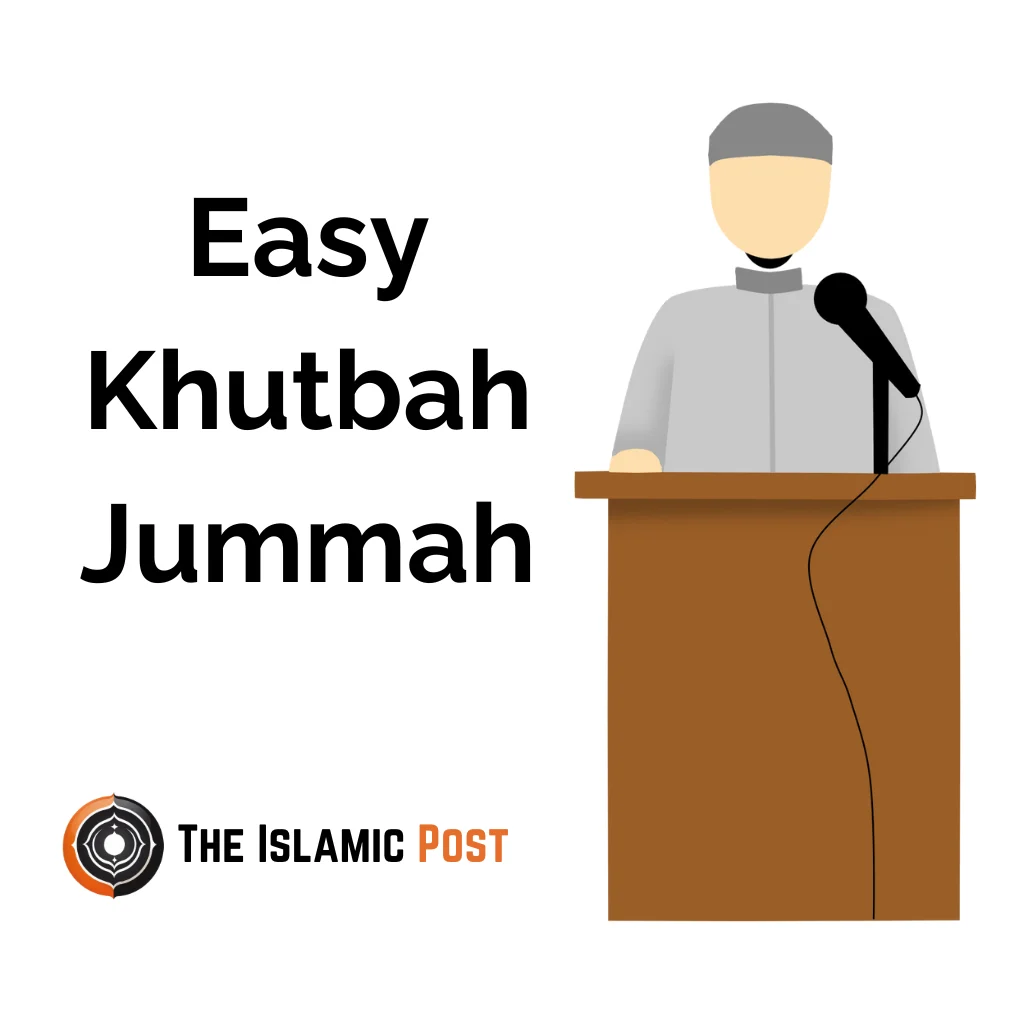
First Khutbah
بسم الله الرحمن الرحيم
الْحَمْدُ لِلَّهِ رَبِّ الْعَالَمِينَ، الَّذِي يُحِبُّ التَّوَّابِينَ وَيُحِبُّ الْمُتَطَهِّرِينَ.
أَشْهَدُ أَنْ لَا إِلَهَ إِلَّا اللَّهُ وَحْدَهُ لَا شَرِيكَ لَهُ، الْمَلِكُ الْحَقُّ الْمُبِينُ.
وَأَشْهَدُ أَنَّ سَيِّدَنَا مُحَمَّدًا عَبْدُهُ وَرَسُولُهُ، الصَّادِقُ الْوَعْدِ الْأَمِينُ.
اللَّهُمَّ صَلِّ وَسَلِّمْ وَبَارِكْ عَلَى سَيِّدِنَا مُحَمَّدٍ، وَعَلَى آلِهِ الْمُبَارَكِينَ، وَصَحَابَتِهِ النُّجَبَاءِ الْمُتَّقِينَ، وَمَنْ تَبِعَهُمْ بِإِحْسَانٍ إِلَى يَوْمِ الدِّينِ.
اللَّهُمَّ اغْفِرْ لَنَا وَلِأَبْنَائِنَا وَذَوِي أَرْحَامِنَا وَجَمِيعِ الْمُسْلِمِينَ.
Dear Believers, Dear Brother in Faith,
Many believers in our time feel the difficulty of fulfilling divine obligations—Salah, Sawm, Zakat, and Hajj. This is because they do not grasp the divine wisdom behind these Fard obligations.
When a child is born into this world, a message is sent to him, as mentioned in tradition:
“يَا ابْنَ آدَمَ، خَلَقْتُكَ طَاهِرًا نَظِيفًا، فَاجْتَهِدْ أَنْ تَلْقَانِي كَمَا خَلَقْتُكَ طَاهِرًا نَظِيفًا.”
“O son of Adam, I created you pure and clean. Strive to meet Me as I created you—pure and clean.”
Yet, within every human is a soul that inclines toward evil, and in their chest may reside a whispering shaytan. Allah, the Almighty, knows this and thus has ordained these obligations to purify His worshipers.
Allah desires His servants to remain pure and clean at all times, so that when their time comes, they meet Him in a state He loves, “for Allah loves those who repent and those who purify themselves.”
The First Obligation: Prayer (الصلاة)
Why Allah calls us to Salah? listen to this Aya in the Quran:
“فَاطِرِ السَّمَاوَاتِ وَالْأَرْضِ ۖ يَدْعُوكُمْ لِيَغْفِرَ لَكُم” (إبراهيم: 10).
“He is the Creator of the heavens and the earth. He calls you to forgive you your sins.” (Quran 14:10)
Why calls us to Salah, to forgive our sins, to answer our Dua, and to fulfill our hope.
The Prophet ﷺ illustrated this wisdom with a hadith that explains this fact:
أَرَأَيْتُمْ لَوْ أَنَّ نَهْرًا بِبَابِ أَحَدِكُمْ يَغْتَسِلُ فِيهِ كُلَّ يَوْمٍ خَمْسًا هَلْ يَبْقَى مِنْ دَرَنِهِ شَيْءٌ؟ قَالُوا: لَا يَبْقَى مِنْ دَرَنِهِ شَيْءٌ قَالَ: فَذَلِكَ مَثَلُ الصَّلَوَاتِ الْخَمْسِ يَمْحُو اللَّهُ بِهِنَّ الْخَطَايَا
“If there were a river at your door and you bathed in it five times a day, would any impurity remain?” They said, “No.” He said, “That is the likeness of the five prayers: Allah erases sins through them.” (Sahih Muslim)
My dear Muslim, between Fajr and Dhuhr, one may commit sins knowingly or unknowingly. Yet, the All-Knowing knows about it, when Dhuhr Salah comes, Allah Subhanhu Watala forgives what was between Fajr and Dhuhr, keeping the believer pure and ready to meet the Most Merciful.
When the month of Ramadan comes. The Prophet ﷺ said about it:
مَنْ صَامَ رَمَضَانَ إِيمَانًا وَاحْتِسَابًا، غُفِرَ لَهُ مَا تَقَدَّمَ مِنْ ذَنْبِهِ.
“Whoever fasts Ramadan with faith and hope for reward, their past sins are forgiven.” (Sahih al-Bukhari).
This all is for you to be forgiven servant of Allah.
And if Allah grants a person the opportunity to perform ḥajj, the Messenger of Allah ﷺ said:
مَنْ حَجَّ لِلَّهِ فَلَمْ يَرْفُثْ وَلَمْ يَفْسُقْ، رَجَعَ كَيَوْمِ وَلَدَتْهُ أُمُّهُ.”
Whoever performs ḥajj for the sake of Allah and does not engage in obscenity or sin, he will return [free of sin] as the day his mother gave birth to him.” (Bukhari, narrated by Abū Hurayrah رضي الله عنه)
As for zakāh, the Prophet ﷺ said:
خُذْ مِنْ أَمْوَالِهِمْ صَدَقَةً تُطَهِّرُهُمْ وَتُزَكِّيهِمْ بِهَا”
Take from their wealth a charity to purify them and sanctify them with it.” (At-Tawbah: 103)
Your Sadaqah purifies your money, your body, and grants Brakah to your house by Allah Subhanhu Watala.
Thus, the divine obligations serve one fundamental purpose: to keep you in a state of purity so that when the moment of death arrives, we meet our Lord with a clean heart and forgiven.
أقولُ قَولي هذا وأستغفِرُ الله لي ولكم فاستغفِروه، إنَّه هو الغفورُ الرحيم.
Second Khutbah
ٱلْحَمْدُ لِلَّهِ رَبِّ ٱلْعَالَمِينَ، وَٱلْعَاقِبَةُ لِلْمُتَّقِينَ، وَلَا عُدْوَانَ إِلَّا عَلَى ٱلظَّالِمِينَ.
وَأَشْهَدُ أَنْ لَا إِلٰهَ إِلَّا ٱللَّهُ وَحْدَهُ لَا شَرِيكَ لَهُ، هُوَ ٱلرَّبُّ ٱلْقَادِرُ ٱلْفَعَّالُ لِمَا يُرِيدُ فِي كُلِّ وَقْتٍ وَحِينٍ.
وَأَشْهَدُ أَنَّ سَيِّدَنَا مُحَمَّدًا عَبْدُ ٱللَّهِ وَرَسُولُهُ، بَلَّغَ ٱلرِّسَالَةَ، وَأَدَّى ٱلْأَمَانَةَ، وَتَرَكَنَا عَلَى ٱلْمَحَجَّةِ ٱلْبَيْضَاءِ، لَيْلُهَا كَنَهَارِهَا، لَا يَزِيغُ عَنْهَا بَعْدَهُ إِلَّا هَالِكٌ.
ٱللَّهُمَّ صَلِّ وَسَلِّمْ وَبَارِكْ عَلَىٰ سَيِّدِنَا مُحَمَّدٍ وَٱرْزُقْنَا هُدَاهُ، وَوَفِّقْنَا لِلْعَمَلِ بِشَرْعِهِ أَجْمَعِينَ يَا ٱللَّهُ.
Allah created humans to be in a society, no body can have a good life in a society without worry, grief, or misery unless there are safety and peaceful relationships between one another in this this society.
Islam was revealed as a way of life that fosters peace and brotherhood. A society can only thrive in harmony if mutual respect and good character prevail among its members. This is why the Messenger of Allah ﷺ declared:
إِنَّمَا بُعِثْتُ لِأُتَمِّمَ مَكَارِمَ الْأَخْلَاقِ.
“Indeed, I was sent to perfect good character.” (Aḥmad, narrated by Abū Hurayrah رضي الله عنه)
People couldn’t live in peace and harmony without good morals.
So, Salah serves as a safeguard against corruption:
إِنَّ الصَّلَاةَ تَنْهَىٰ عَنِ الْفَحْشَاءِ وَالْمُنكَرِ.
“Indeed, prayer restrains from immorality and wrongdoing.” (Al-‘Ankabūt: 45)
The main function of Salah is to make the servant observe his lord. So that he doesn’t do anything that angers Allah or angers Allah’s creation. Rather, he does what pleases Allah’s servants and what will gain the pleasure of his Lord.
If someone does all Fard and Sunnah and acts of worship and doesn’t get the noble character. How is he?
The Prophet ﷺ warned of those who perform acts of worship yet lack good character. He was asked:
يَا رَسُولَ اللَّهِ، إِنَّ فُلَانَةَ تُصَلِّي وَتَصُومُ وَلَكِنَّهَا تُؤْذِي جِيرَانَهَا. فَقَالَ: هِيَ فِي النَّارِ.
“O Messenger of Allah, a certain woman prays and fasts but harms her neighbors.” He said, “She is in the Fire.” (Aḥmad, narrated by Abū Hurayrah رضي الله عنه).
That is if Salah and Sawm don’t prevent a person from immortality and wrongdoing. It was reported by Ibn Abbas Hadith Marfoo: “Whoever’s prayer does not prevent him from immorality and wrongdoing, will only grow further away from God.”
Similarly, the prophet said about fasting that it is not merely abstaining from food and drink; it is a shield:
إِذَا كَانَ يَوْمُ صَوْمِ أَحَدِكُمْ فَلَا يَرْفُثْ وَلَا يَجْهَلْ، فَإِنْ سَابَّهُ أَحَدٌ أَوْ قَاتَلَهُ، فَلْيَقُلْ: إِنِّي صَائِمٌ.
“If one of you is fasting, let him not engage in obscenity or argumentation. If someone insults or fights him, let him say, ‘I am fasting.’” (Bukhari, narrated by Abū Hurayrah رضي الله عنه)
And so is Hajj. Allah ordered some characteristics on the worshiper performing Hajj.
Allah Said: “فَمَن فَرَضَ فِيهِنَّ الْحَجَّ فَلَا رَفَثَ وَلَا فُسُوقَ وَلَا جِدَالَ فِي الْحَجِّ ” (167 البقرة)
So in Hajj, no talking about women or nondesirable talk with women. No disobedience of Allah and no argumentation is a bargain in buying and selling. The person performing Hajj should have the noble character.
Dear Blessed Congregation,
Allah Subhanhu Watala ordered Fard acts of worship so we can have our sins forgiven and meet him with pure and purified hearts. Fard acts of worship ease the road for us towards that and help us in this life to have a noble character.
May Allah make us among those who uphold these divine obligations with sincerity and good character.
Translation by: Ustaz Abobakr.
